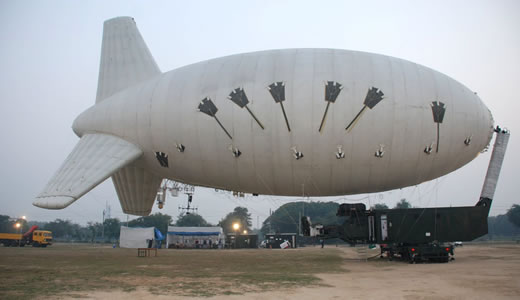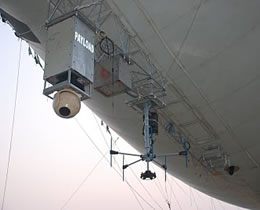
Aerostats are becoming popular in India, for their simple and reliable operation, extended persistence on missions and low operating cost. India has already deployed several aerostat-borne radar systems, used as ‘gap fillers’ in regions where ground-bound radar coverage is incomplete or in high priority areas requiring continuous radar coverage.
India has reportedly deployed several IAI/Elta EL/M-2083 air surveillance radar systems in such application, carried on large aerostats. In 2004 the Indian Air Force received the first of six EL/M-2083 radar aerostat from Israel. Each of these radars is capable of covering a three-dimensional volume (including look-down low-altitude coverage) equal to 30-40 ground-based radars. deploying them along the border in Kutch region and Punjab. The total requirement of the IAF is projected at 13 Aerostat radars. In 2009 the Indian Navy ordered two additional such aerostat-radars, to improve coastal protection.


At Aero-India 2011 Defence Research and Development Organisation (DRDO) and Aerial Delivery Research & Development Establishment (ADRDE), will be demonstrate the indigenously developed Akashdeep aerostat, designed to carry a different payload optimized for ground surveillance missions.

During the airshow operational demonstration spanning on all show days, Akashdeep will be equipped with a full mission system including payloads, designed to support anti-terror and security aerial surveillance. Akashdeep aerostat carries an gyro-stabilized electro-optical day/night (thermal) payload an integrated with Communications Intelligence (Comint) payloads.
Another, smaller aerostat to fly at Aero-India is the SkyStar 300 from Aeronautics. The Israeli company is demonstrating at Aero-India an operational, aerostat-based persistent surveillance system based on the rapidly deployable Skaystar system, equipped with the Speed-A electro-optical payload developed by Controp. This sensor is optimized for aerostat operations. Speed-A uses five axis stabilization, offering maximum stability necessary for the employment of high resolution, long focal plane telescopic cameras.
Another Israeli company highlighting aerostat sensor platforms is Rafael, one of the prime contractors for such systems in Israel.
















